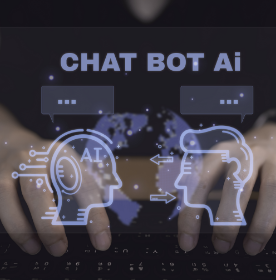Impact of ChatGPT on Automation
- Featured Insights
- June 2, 2023
Artificial intelligence (AI) has witnessed rapid advancements in recent years, with deep large learning models like GPT leading the way. These models can generate human-like language, which opens a wide range of possibilities for automation and AI. There are several key areas where GPT can significantly impact automation and AI.
Natural Language Processing:
NLP is the area of AI concerned with enabling computers to understand, interpret, and generate human language. With its ability to generate natural language text, ChatGPT can automate tasks that require NLP, such as summarizing text, performing sentiment analysis, extracting information, and generating responses with remarkable accuracy. This automation empowers industries like customer support, content generation, and market research, enabling faster analysis and efficient communication.

Intelligent Automation:
GPT’s ability allow RPA systems to process complex instructions, understand financial documents and perform tasks that previously required human intervention. It enables banks to streamline operations, reduce errors, and improve efficiency. By integrating GPT into workflow automation systems, organizations can automate complex tasks that previously required human intervention.
Unstructured Document Processing:
Processing and deriving insights from unstructured data have long been challenging tasks. GPT-based automation offers a solution by effectively processing unstructured data, including text, images, and audio files. These models can categorize and tag documents, extract essential information, and identify patterns and trends within vast datasets. This automation is particularly beneficial for industries such as research, finance, and healthcare, where large volumes of unstructured data get analysed.
Intelligent Virtual Assistant:
GPT-based automation has given rise to intelligent assistants that can understand and respond to human queries or commands. Integrated into chatbots or virtual agents, these assistants provide personalized assistance, answer questions, and perform tasks based on user input.
Predictive Analysis:
GPT models can be utilized for predictive analysis, leveraging historical data and patterns to make informed predictions about future outcomes. By training GPT models on vast datasets, businesses can automate the process of forecasting demand, predicting market trends, or identifying potential risks.
Use Case: Customer Support Resolution For E-Commerce
By employing GPT models, businesses can automate responses to customer queries and provide real-time assistance. The models can understand the intent behind customer messages, generate relevant responses, and even resolve simple issues without human intervention. This automation significantly reduces the workload on customer support agents, improves response times, and enhances overall customer satisfaction. Additionally, GPT models can learn from previous interactions, leading to continuous improvement in their ability to provide accurate and helpful responses to customer queries.
Conclusion:
ChatGPT and other advanced language models are having a significant impact on automation and AI. From natural language processing to unstructured data processing and training data generation, ChatGPT is changing how we approach these fields. As technology evolves, we can expect to see even more applications and use cases for ChatGPT and other advanced AI models.